Abstract
Purpose
This study was a systematic review and meta-analysis designed to evaluate the effects of breastfeeding intervention on breastfeeding rates.
Methods
Based on the guidelines of the Preferred Reporting Items for Systematic Reviews and Meta-analyses (PRISMA), a systematic search was conducted using eight core electronic databases and other sources including gray literature from January 9 to 19, 2017. Two reviewers independently select the studies and assessed methodological risk of bias of studies using the Cochrane criteria. The topics of breastfeeding interventions were analyzed using descriptive analysis and the effects of intervention were meta-analyzed using the Review Manager 5.2 software.
Results
A total of 16 studies were included in the review and 15 were included for meta-analysis. The most frequently used intervention topics were the importance of good latch-on and frequency of feeding and determining adequate intake followed. The pooled total effect of breastfeeding intervention was 1.08 (95% CI 1.03~1.13). In the subgroup analysis, neither pre-nor post-childbirth intervention was effective on the breastfeeding rates at 1, 3, and 6 months, and neither group nor individual interventions had an effect. Only the 1 month breastfeeding rate was found to be affected by the individual intervention with the persistent strategies 1.21 (95% CI 1.04~1.40).
Conclusion
Effective breastfeeding interventions are needed to help the mother to start breastfeeding after childbirth and continue for at least six months. It should be programmed such that individuals can acquire information and specific breastfeeding skills. After returning home, there should be continuous support strategies for breastfeeding as well as managing various difficulties related to childcare.
References
1. United Nations Children’s Fund. I like my mother’s milk [Internet]. New York: Author;c2016. [cited 2016 Aug 2]. Available from:. http://www.unicef.or.kr/news/story_view.asp?idx=58788.
2. World Health Organization. Infant and young children: Model chapter for textbooks for medical students and allied health professionals [Internet]. Geneva: World Health Organization;c2009. [cited 2009 Nov 13]. Available from:. http://apps.who.int/iris/bitstream/10665/44117/1/9789241597494_eng.pdf?ua=1.
3. United Nations Children’s Fund. Convention on the rights of the child [Internet]. New York: Cornell University ILR School;c1989. [cited 1989 Nov 20]. Available from:. https://www.unicef.org/cholera_toolkit/Resources/Annexes/Supporting_Re-sources/Annex_1A/Convention_Rights_of_the_Child.doc.
4. Choi EJ, Park EJ, Kim HR, Oh MA, Lee NH, Choi JH. Survey on breastfeeding in Korea. Seoul: Korea Institute for Health and Social Affairs (KIHASA);2016. May. Report No.: 2016-17.
5. Kim SK, Kim YK, Cho AJ, Kim HR, Lim SE. The 2009 national survey on fertility, family health and welfare in Korea. Seoul: Korea Institute for Health and Social Affair (KIHASA);2009. Dec. Report No.: 2009-33.
6. Dennis CL. Breastfeeding initiation and duration: A 1990-2000 literature review. Journal of Obstetric, Gynecologic and Neonatal Nursing. 2002; 31(1):12–32. https://doi.org/10.1111/j.1552-6909.2002.tb00019.x.

7. Cho J, Ahn S. Development and evaluation of breastfeeding promotion program for mothers with breast engorgement following cesarean birth. Journal of Korean Academy of Nursing. 2014; 44(2):170–178. https://doi.org/10.4040/jkan.2014.44.2.170.

8. Choi EY, Park BS, Park SJ. Integrative review of domestic research papers on breast-feeding intervention. Journal of the Korea Academia-Industrial Cooperation Society. 2016; 17(1):441–452. https://doi.org/10.5762/KAIS.2016.17.1.441.

9. Horta BL, Victora CG. Long-term effects of breastfeeding: A systematic review. Geneva: World Health Organization;c2013. [cited 2016 Jan 30]. Available from. http://www.who.int/ma-ternal_child_adolescent/documents/breastfeeding_long_term_effects/en/.
10. Guise JM, Palda V, Westhoff C, Chan BK, Helfand M, Lieu TA. U.S. Preventive Services Task Force. The effectiveness of primary care-based interventions to promote breastfeeding: Systematic evidence review and meta-analysis for the US Preventive Services Task Force. Annals of Family Medicine. 2003; 1(2):70–78. https://doi.org/10.1370/afm.56.
11. Sinha B, Chowdhury R, Sankar MJ, Martines J, Taneja S, Mazumder S, et al. Interventions to improve breastfeeding outcomes: A systematic review and meta-analysis. Acta Paediatrica. 2015; 104(S467):114–134. https://doi.org/10.1111/apa.13127.

12. Jeong GH. Effect of the nursing intervention program on promoting the breast-feeding practice in primipara [dissertation]. Seoul: Ewha Women University;1997. p. 1–145.
13. World Health Organization. Evidence for the ten steps to successful breastfeeding [Internet]. Geneva: Authors;c1998. [cited 2009 Nov 13]. Available from:. http://www.who.int/ma-ternal_child_adolescent/documents/9241591544/en/.
14. World Health Organization. Indicators for assessing infant and young child feeding practices part 3: country profiles [Internet]. Geneva: World Health Organization;c2010. [cited 2011 Nov 9]. Available from:. http://apps.who.int/iris/bitstream/10665/44368/1/9789241599757_eng.pdf.
15. Higgins JPT, Green S. Cochrane handbook for systematic reviews of interventions version 5.1.0 [Internet]. London (UK): The Cochrane Collaboration;c2011. [cited 2016 Nov 29]. Available from. http://handbook.cochrane.org.
16. Wong KL, Fong DY, Lee IL, Chu S, Tarrant M. Antenatal education to increase exclusive breastfeeding: A randomized controlled trial. Obstetrics and Gynecology. 2014; 124(5):961–968. https://doi.org/10.1097/aog.0000000000000481.
17. Sterne JA, Sutton AJ, Ioannidis JP, Terrin N, Jones DR, Lau J, et al. Recommendations for examining and interpreting funnel plot asymmetry in meta-analyses of randomised controlled trials. BMJ. 2011; 343:d4002. https://doi.org/10.1136/bmj.d4002.

18. Mattar CN, Chong YS, Chan YS, Chew A, Tan P, Chan YH, et al. Simple antenatal preparation to improve breastfeeding practice: A randomized controlled trial. Obstetrics and Gynecology. 2007; 109(1):73–80. https://doi.org/10.1097/01.AOG.0000249613.15466.26.
19. Yun SE, Lee HK. Effects of breast-feeding adaptation, attitude and practice of primipara depending on method of postpartum breast-feeding education. Korean Journal of Women Health Nursing. 2012; 18(2):75–84. https://doi.org/10.4069/kjwhn.2012.18.2.75.

20. Pugin E, Valdés V, Labbok MH, Pérez A, Aravena R. Does prenatal breastfeeding skills group education increase the effectiveness of a comprehensive breastfeeding promotion program? Journal of Human Lactation. 1996; 12(1):15–19. https://doi.org/10.1177/089033449601200105.

21. Kim HR. Breastfeeding trends, affecting factor and policy option for breastfeeding promotion in Korea. Health and Welfare Policy Forum. 2013; 201:49–60.
22. Yang HJ, Seo JM. Concept analysis of effective breastfeeding. Korean Journal of Women Health Nursing. 2011; 17(4):317–327. https://doi.org/10.4069/kjwhn.2011.17.4.317.

23. Cho KJ, Lee KJ, Lee OJ. The effect of the educational program on caring-confidence and rearing attitude in mothers with newborns. Journal of Korean Academy of Child Health Nursing Research. 1999; 5(1):84–96.
24. Lee AR, Park MH. Primiparas’ perceptions of their newborns related to feeding methods. Korean Journal of Child Health Nursing. 1995; 1(1):16–25.
25. Schreck PK, Solem K, Wright T, Schulte C, Ronnisch KJ, Sz-punar S. Both prenatal and postnatal interventions are needed to improve breastfeeding outcomes in a low-income population. Breastfeeding Medicine. 2017; 12(3):142–148. https://doi.org/10.1089/bfm.2016.0131.

26. Kluka SM. A randomized controlled trial to test the effect of an antenatal educational intervention on breastfeeding duration among primiparous women [dissertation]. Vancouver: University of British Columbia;2004. p. 1–229.
27. Park YH, Park MK. Effects of couple breastfeeding education program for the enhancement of primipara suyu. The Korea Contents Association. 2017; 17(6):329–338. https://doi.org/10.5392/JKCA.2017.17.06.329.
28. Chapman DJ, Damio G, Young S, Pérez-Escamilla R. Effectiveness of breastfeeding peer counseling in a low-income, predominantly Latina population: A randomized controlled trial. Archives of Pediatrics and Adolescent Medicine. 2004; 158(9):897–902. https://doi.org/10.1001/archpedi.158.9.897.
29. Bunik M, Shobe P, O’Connor ME, Beaty B, Langendoerfer S, Crane L, et al. Are 2 weeks of daily breastfeeding support insuffi- cient to overcome the influences of formula? Academic Pediatrics. 2010; 10(1):21–28. https://doi.org/10.1016/j.acap.2009.09.014.
30. Jang GJ. Kim SH. Effects of breast-feeding education and support services on breast-feeding rates and infant’s growth. Journal of Korean Academy of Nursing. 2010; 40(2):277–286. https://doi.org/10.4040/jkan.2010.40.2.277.
Figure 2.
Funnel plots of standard error by standardized mean difference. Individual including continuo
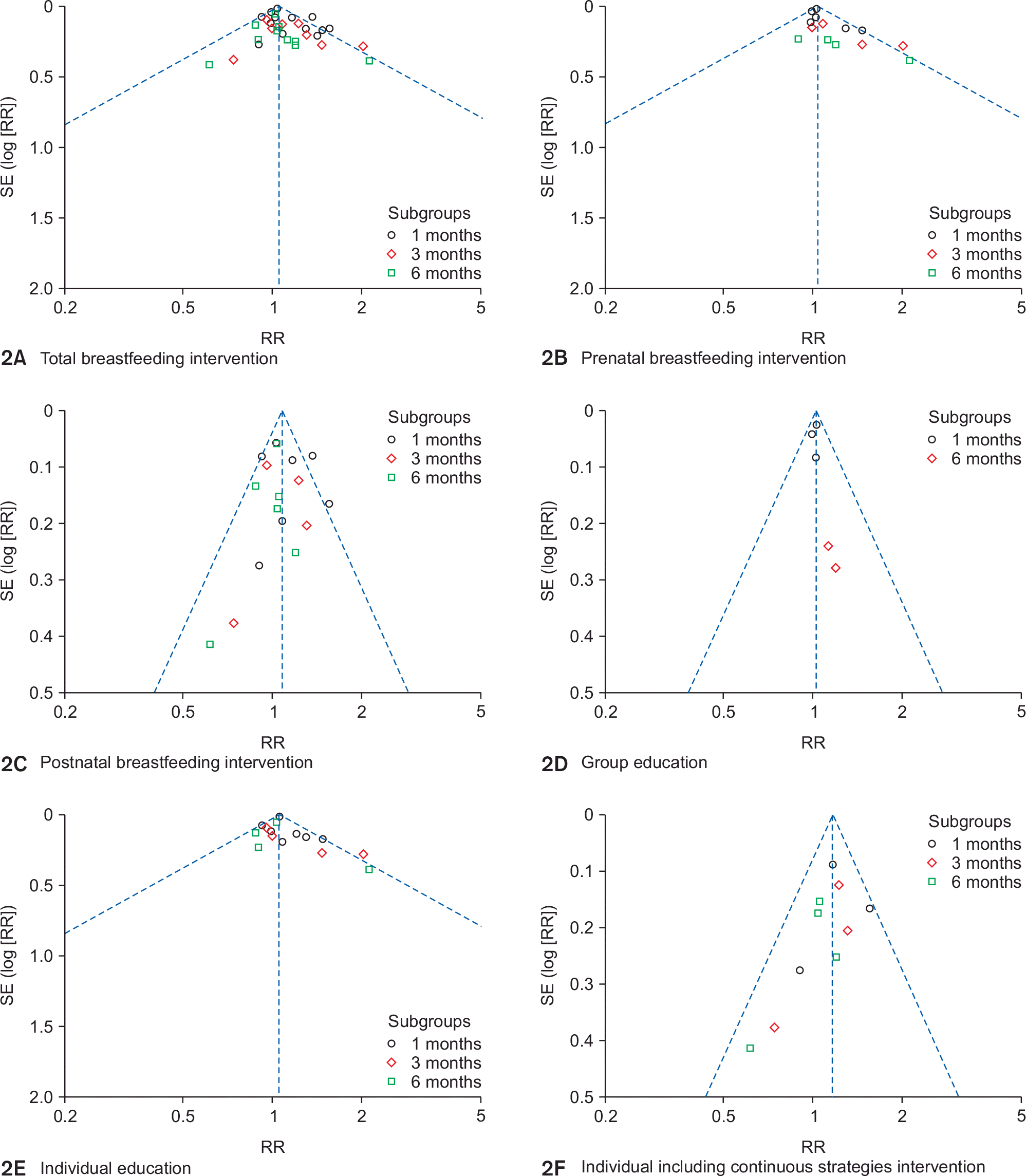
Figure 4.
Effect of prenatal and postnatal breastfeeding intervention at 1, 3, and 6 months postpartum.
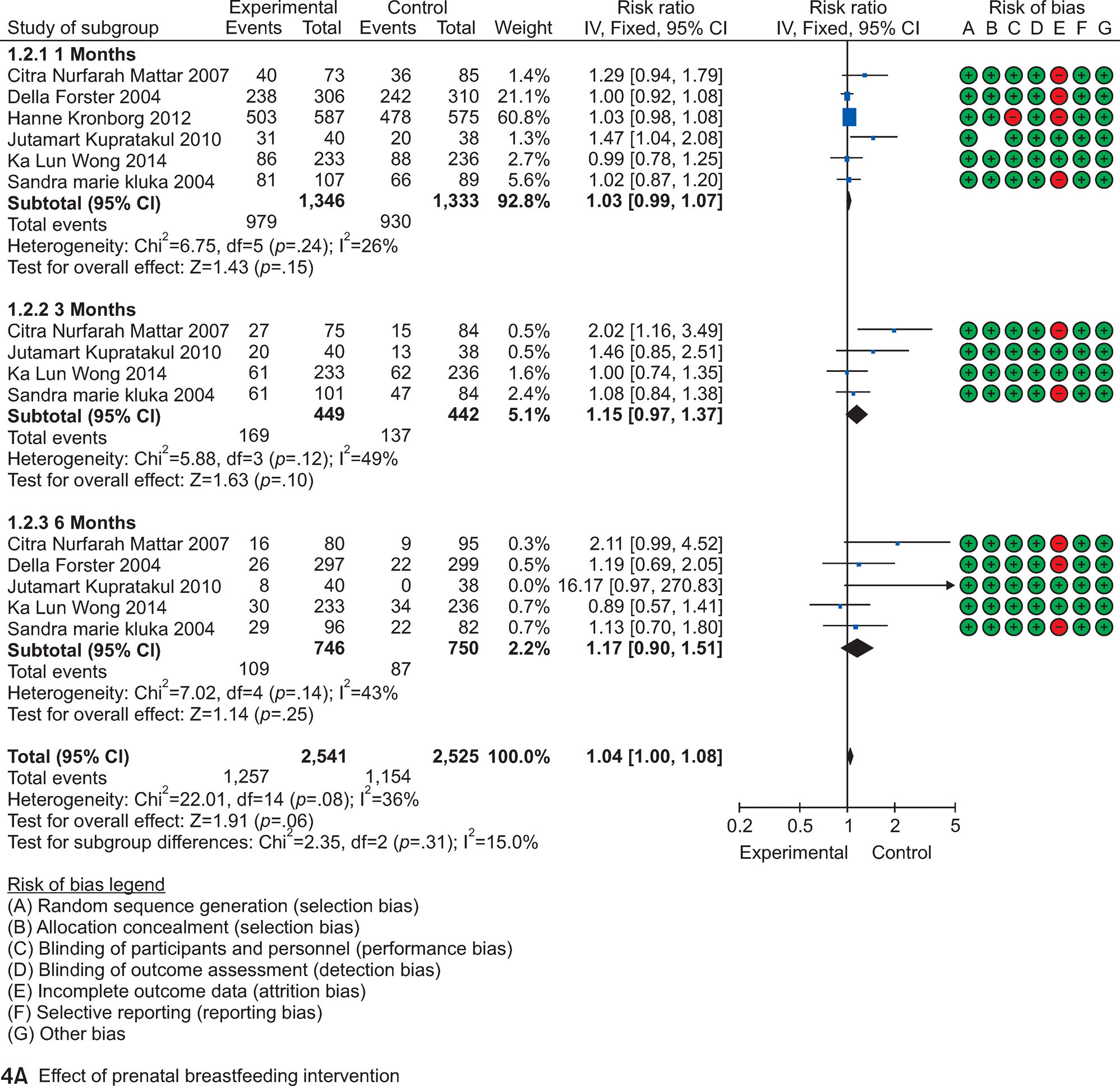
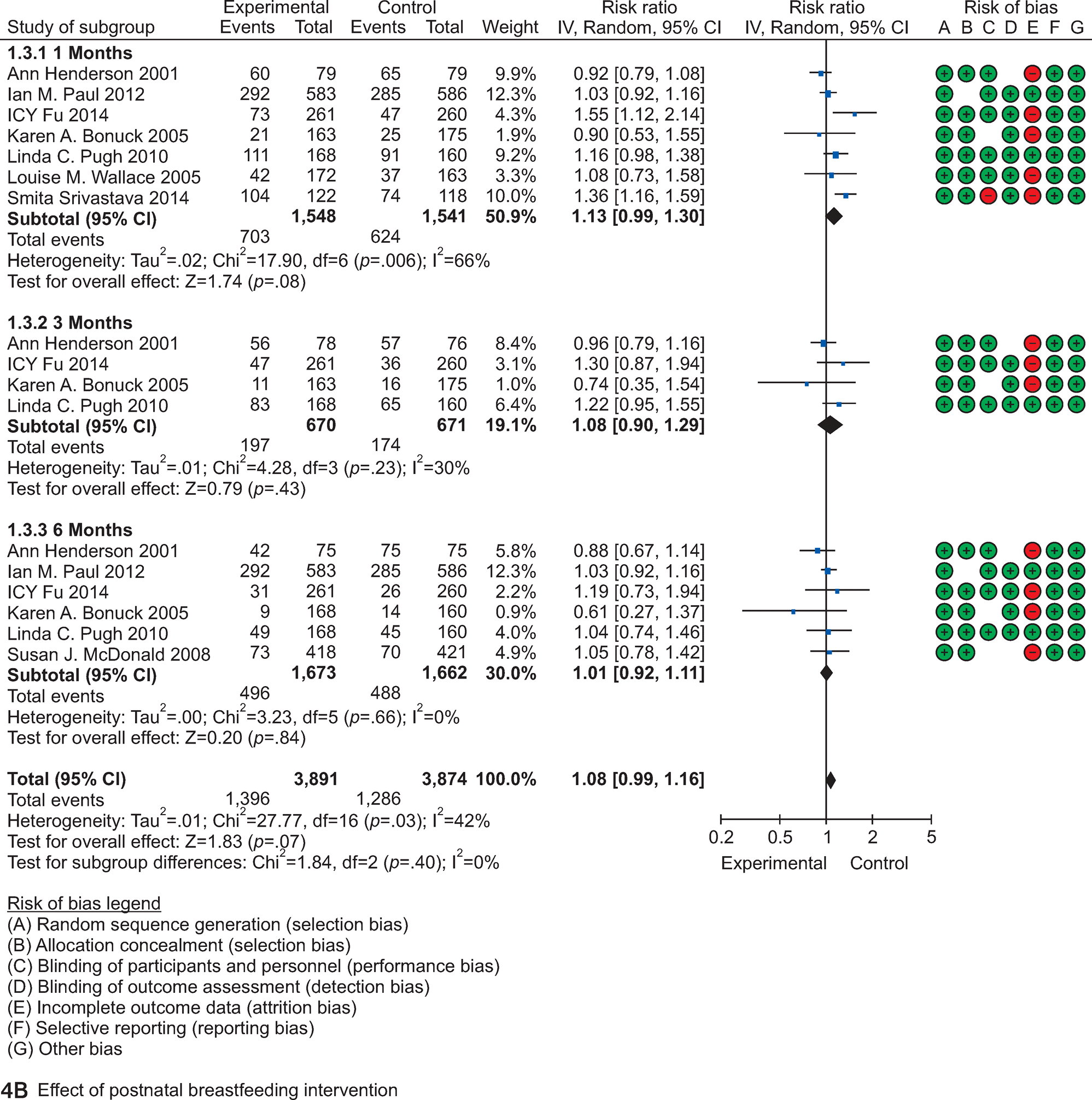
Table 1.
Summary of RCTs with Breastfeeding Intervention




 PDF
PDF ePub
ePub Citation
Citation Print
Print


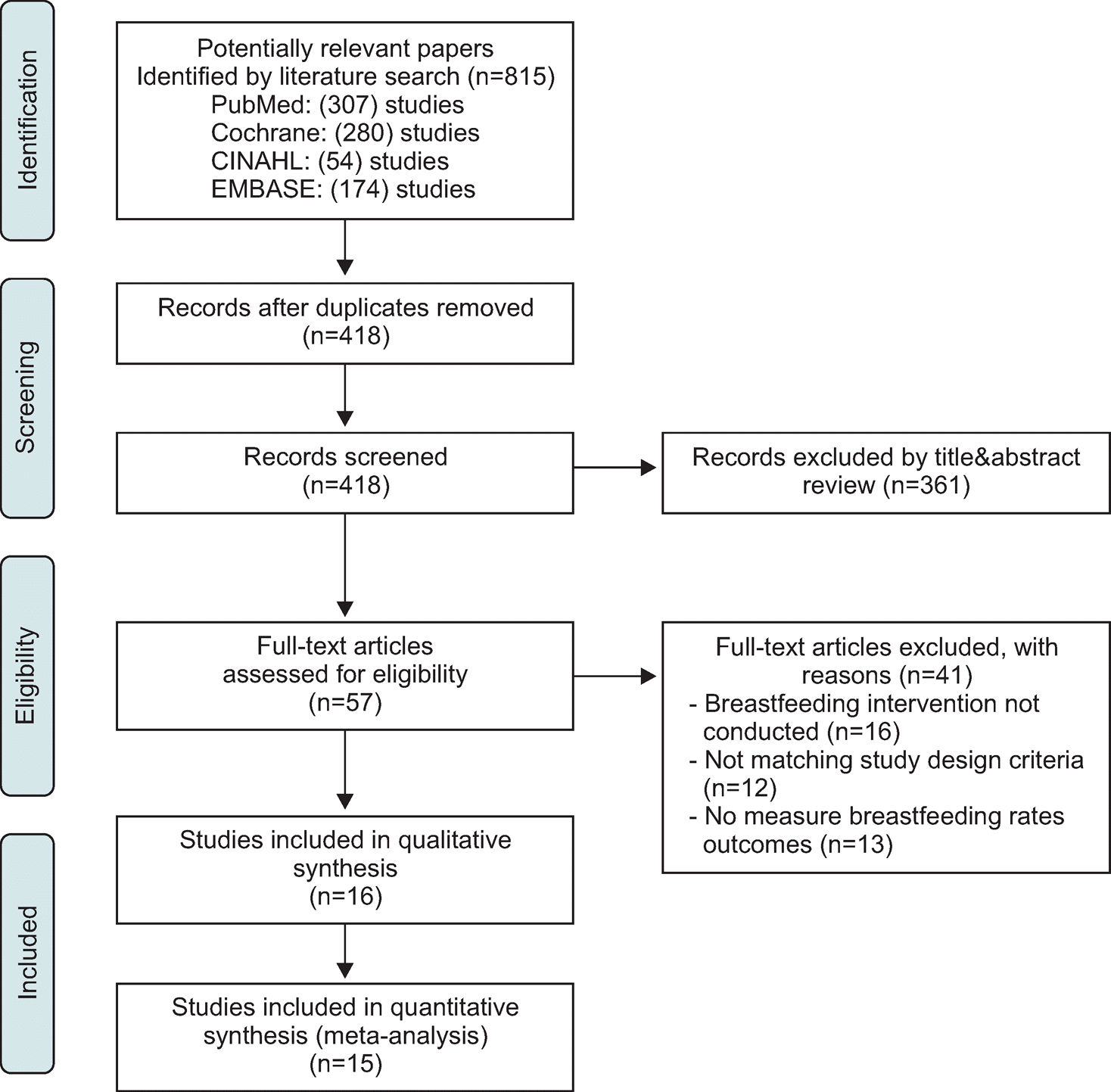
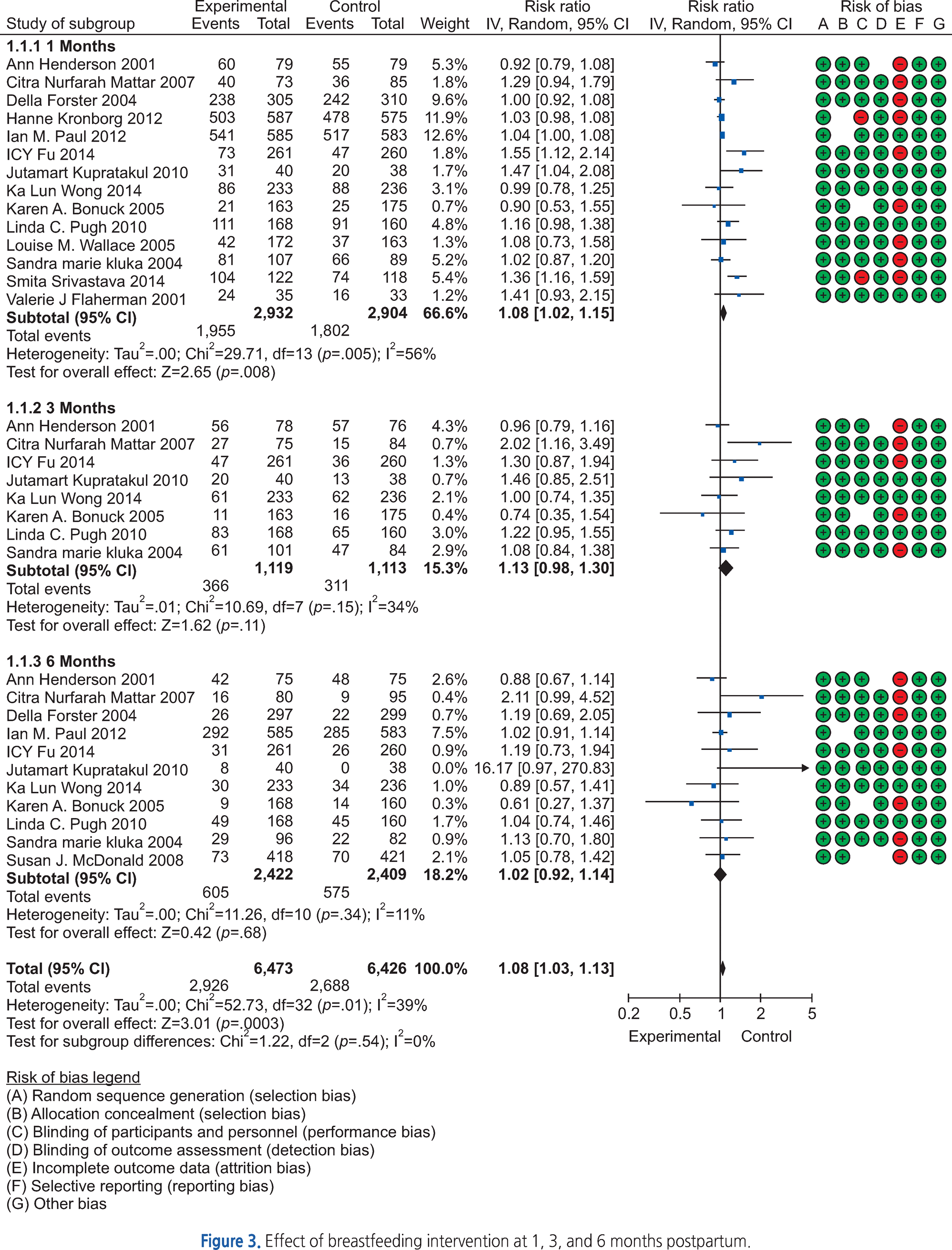
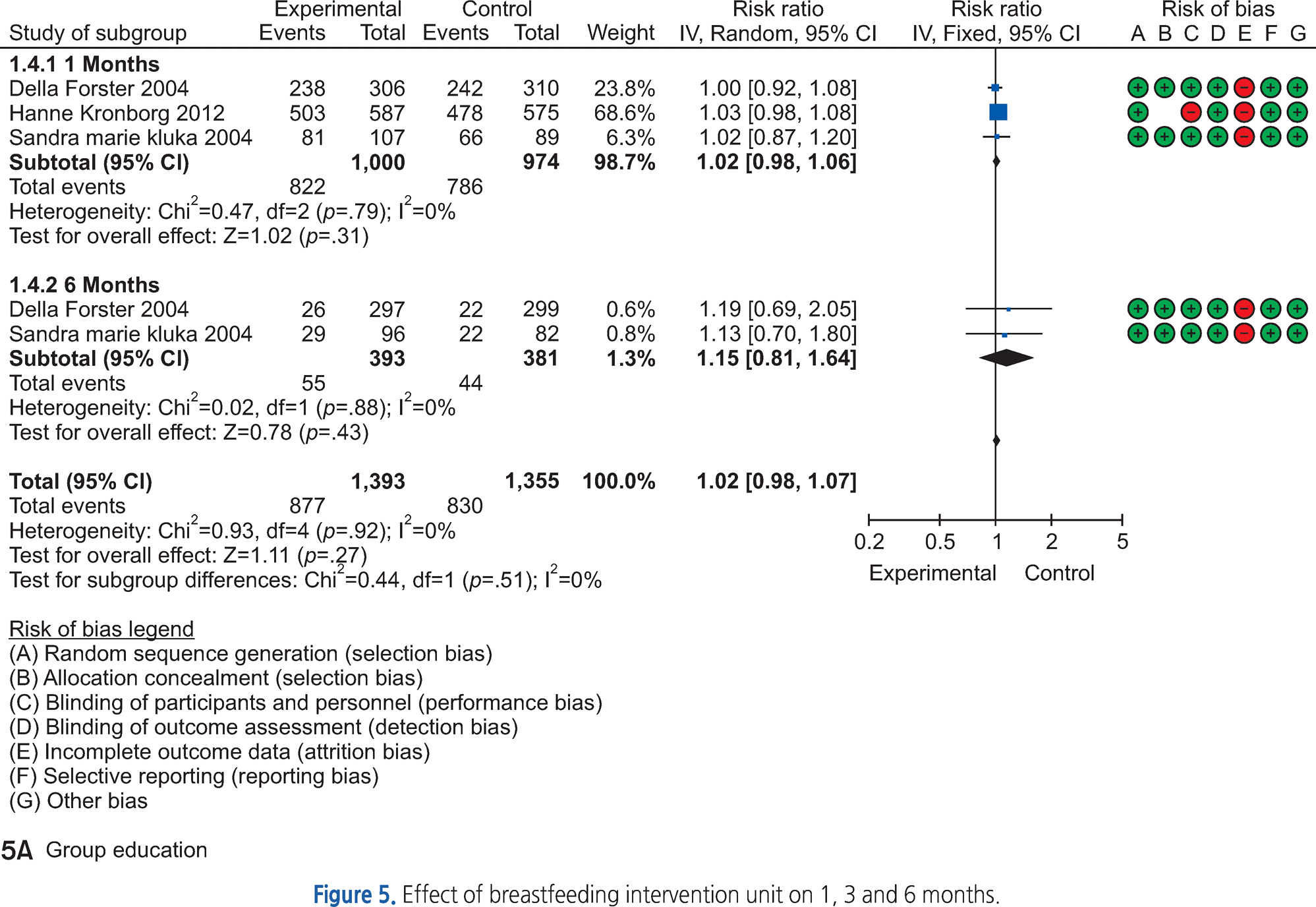
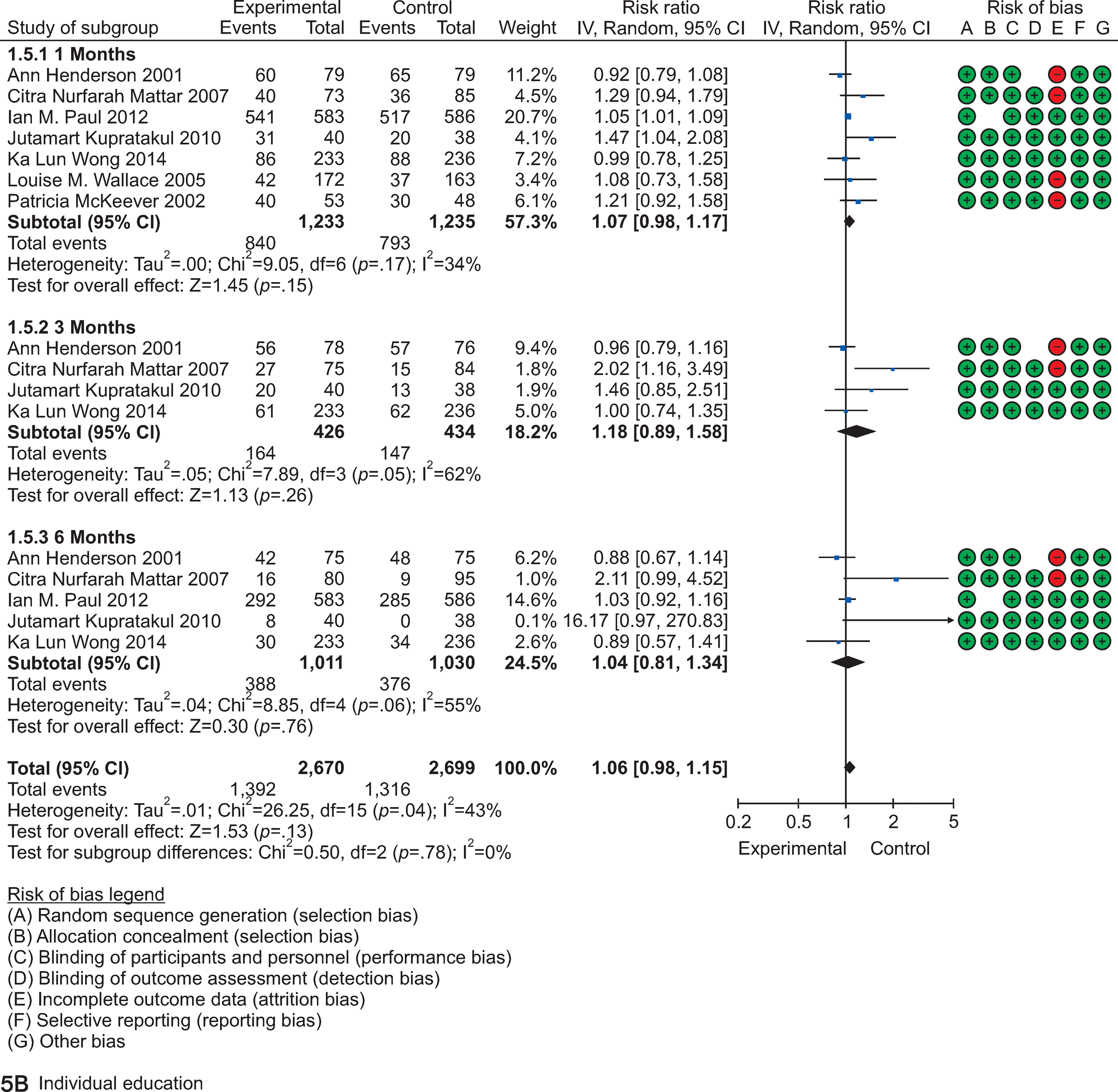
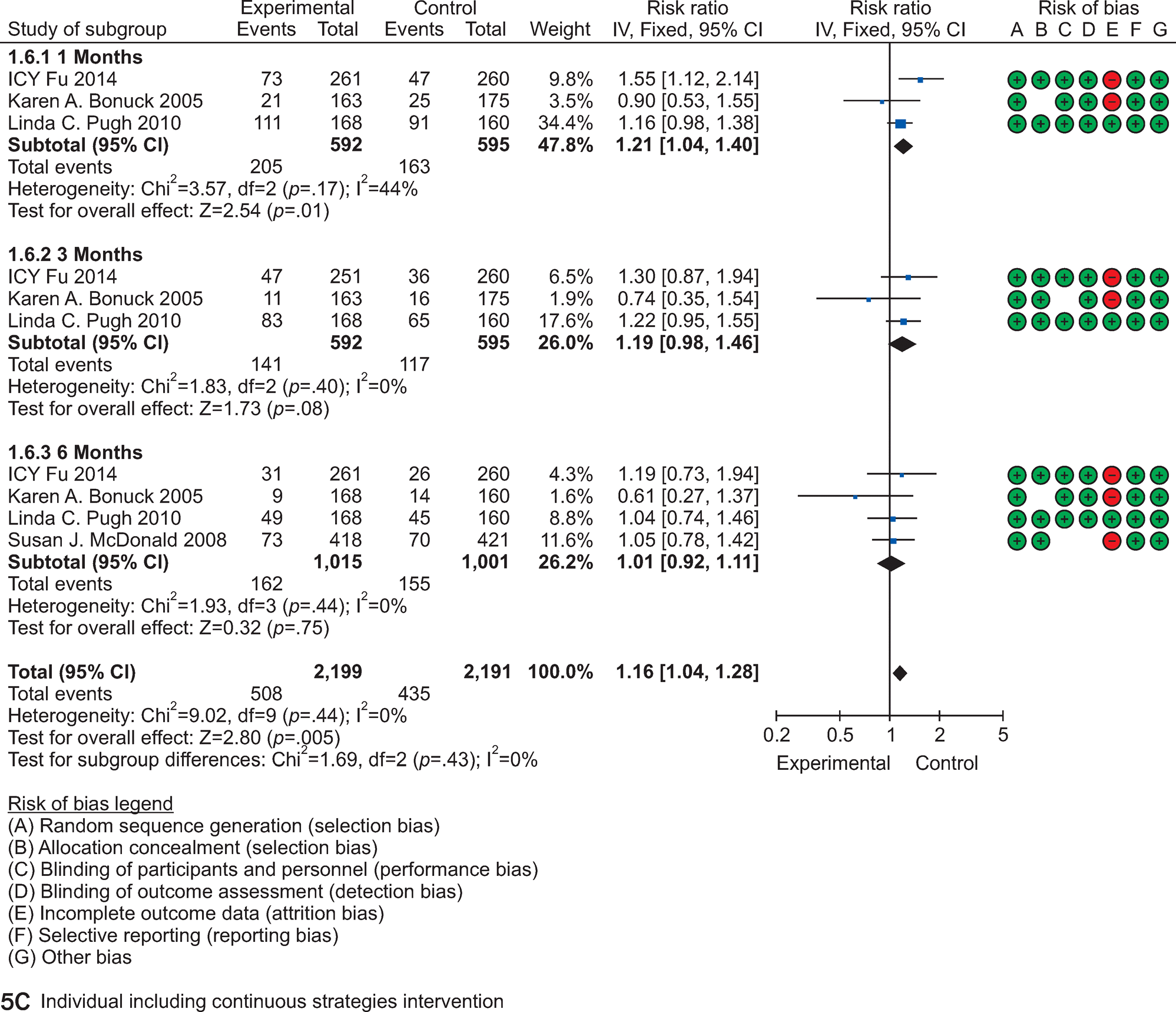
 XML Download
XML Download